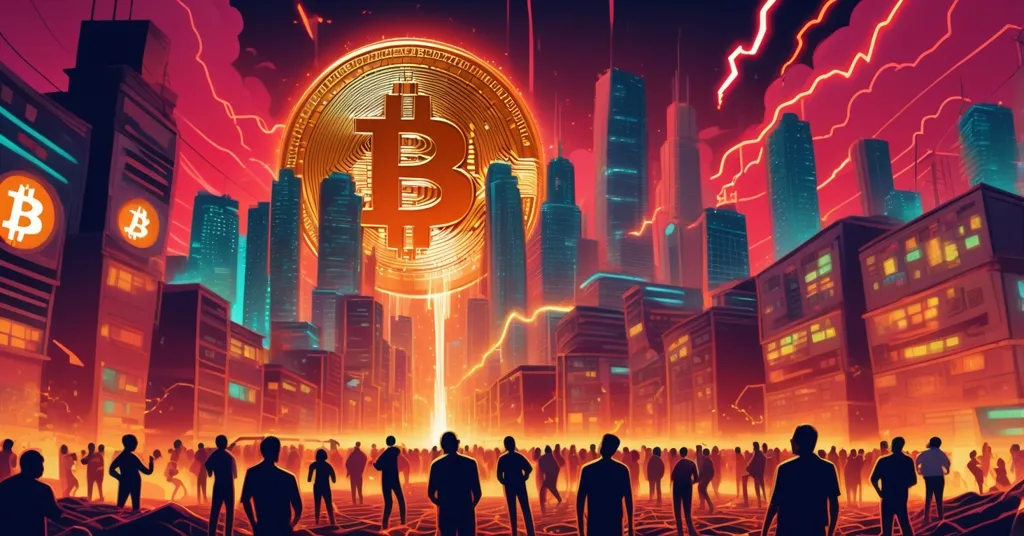El Salvador Buys 1,090 Bitcoin for $101M Amid Market Crash Below $90K

El Salvador Stacks Sats: 1,090 Bitcoin Bought Amid Market Meltdown
El Salvador has dropped a bombshell in the crypto space, snapping up 1,090.19 Bitcoin—worth about $101 million—while the market bleeds out below $90,000. On top of their daily 1 BTC purchase, this move under President Nayib Bukele’s leadership screams defiance against retail panic and signals a rock-solid belief in Bitcoin’s future as a cornerstone of national finance.
- Huge Acquisition: El Salvador buys 1,090.19 BTC (~$101M) during a price crash below $90K.
- Total Treasury: Holdings now stand at 7,474.37 BTC, as confirmed by Bukele.
- Market Contrast: Retail fear clashes with sovereign confidence in Bitcoin’s long-term value.
Let’s set the stage with a quick snapshot of El Salvador’s Bitcoin journey. Since becoming the first nation to adopt BTC as legal tender in September 2021, the Central American country has positioned itself as a trailblazer in the crypto world. Under Bukele’s bold vision, Bitcoin isn’t just digital gold—it’s a tool for economic sovereignty and a lifeline for the unbanked. Despite early hiccups with the state-backed Chivo wallet and public skepticism, their commitment hasn’t wavered. Now, with this latest purchase, they’re doubling down while others run for the hills. For more on this significant acquisition, check out the details of El Salvador’s massive Bitcoin buy.
Market Chaos: Bitcoin’s Brutal Slide
The crypto market is a mess right now. Bitcoin’s price has cratered below $90,000 after getting slapped down from a high of $110K–$115K. This isn’t a gentle correction; it’s a gut punch that’s sent retail traders into a tailspin. Fear is palpable—liquidations are through the roof as over-leveraged positions get wiped out, and volatility is spiking harder than a caffeine addict’s heart rate. For those new to the game, liquidations happen when traders borrow money to bet on price moves, only to have their positions forcibly closed by exchanges when the market turns against them. It’s a domino effect of losses, and right now, it’s amplifying the panic.
Looking at the charts via platforms like TradingView.com, the technical picture ain’t pretty. Bitcoin has broken below its 200-day moving average—a line showing the average price over the last 200 days, often used to judge if a long-term trend is bullish or bearish. It’s also lost key support at $95K, a price level where buyers historically step in to halt a drop. As of now, BTC is hovering around $91K, testing a shaky zone between $88K and $90K. If that cracks, the next major buffer is $80K–$85K, a broader base for the ongoing bull market. Reclaiming $95K soon is critical to avoid a deeper nosedive, but momentum looks weak. Simply put, the market structure is deteriorating, and some analysts are whispering about a full-on bearish cycle.
While retail sentiment sits in the gutter—with many dumping their holdings out of sheer terror—there’s a stark divide. Amidst this backdrop of crumbling charts, El Salvador’s massive buy looks either batshit crazy or brilliantly contrarian, depending on your perspective. They’re not just shrugging off the noise; they’re betting the house on a future most traders can’t see past the next candle on the chart.
Bukele’s Big Bet: Stacking Sats with Swagger
Enter Nayib Bukele, the man steering El Salvador’s Bitcoin ship with unapologetic gusto. The country’s latest haul of 1,090.19 BTC, tracked by blockchain analytics platform Lookonchain, pushes their total stash to 7,474.37 BTC. Bukele didn’t bury this news in a press release—he blasted it out on social media with a screenshot of the nation’s Bitcoin wallet and a one-word caption that hits like a mic drop:
“Woa.”
That single syllable carries weight. It’s a flex, a middle finger to market doom and gloom. While small-time traders capitulate—crypto slang for panic-selling at a loss—El Salvador is stacking sats (accumulating small Bitcoin fractions) like they’ve got a crystal ball showing six-figure prices ahead. Their strategy is straightforward: buy during dips, ignore short-term volatility, and build a treasury that could redefine national wealth. Alongside this blockbuster purchase, they’ve kept up a daily habit of grabbing 1 BTC, slow and steady, rain or shine.
Why does this matter? El Salvador isn’t treating Bitcoin as a speculative toy. They’re positioning it as a national reserve asset, much like gold or US dollars in traditional economies. For a developing nation battling currency devaluation and reliance on foreign remittances, BTC offers a radical hedge—a decentralized currency free from central bank meddling. If Bitcoin revisits all-time highs or surges past, say, $150K in the next bull run, their $101 million investment could multiply. But let’s not sugarcoat it: if a prolonged bear market hits, that treasury could shrink to a fraction of its value, leaving critics plenty of ammo.
A Nation’s Gamble: Genius or Folly?
Let’s play devil’s advocate and get real about the risks. Tying a country’s financial strategy to an asset as wild as Bitcoin is a high-wire act without a net. Skeptics, including heavyweights like the International Monetary Fund (IMF), have sounded alarms over El Salvador’s approach, warning that it threatens financial stability. A 2022 IMF report criticized the move, citing potential losses from volatility as a burden on public funds. If Bitcoin tanks to, say, $50K or lower—a scenario not out of the question in a brutal bear cycle—the nation’s treasury could be underwater, fueling public backlash. For a resource-strapped economy, that’s not just a bad headline; it’s a policy disaster waiting to happen.
On the flip side, let’s counter that with some perspective. Traditional financial systems have screwed over developing nations for decades—look at hyperinflation in places like Venezuela or Zimbabwe, where fiat currencies became toilet paper. Bitcoin, for all its rollercoaster antics, offers an escape hatch: a decentralized store of value that no government can inflate away. Even if prices crash, the ideological win of sticking it to centralized finance isn’t nothing. El Salvador’s gamble could be a blueprint for others if it pays off. Is Bukele a visionary or just rolling the dice with a nation’s future? The crypto world can’t stop debating, but one thing’s clear—they’ve got balls of steel.
Ground-Level Reality: How Do Salvadorans Feel?
Beyond Bukele’s bravado, what’s the vibe on the streets of San Salvador? Early data and anecdotes paint a mixed picture. When Bitcoin became legal tender, adoption wasn’t seamless—the Chivo wallet rollout faced tech glitches, and many citizens grumbled about being pushed into a system they didn’t understand. A 2023 survey by the University of Central America found only about 20% of Salvadorans actively used Bitcoin for transactions, though remittances via BTC have gained traction among some. For the unbanked—a huge chunk of the population—Bitcoin could be a game-changer, bypassing predatory fees from traditional money transfers. But skepticism lingers, especially when price swings wipe out savings overnight. Bukele’s Bitcoin obsession is a top-down push, and whether it wins hearts on the ground remains an open question.
Global Ripples: Could Others Follow Suit?
Zooming out, El Salvador’s aggressive accumulation isn’t just their story—it’s a potential catalyst for broader change. Other nations are watching. The Central African Republic adopted Bitcoin as legal tender in 2022, though with less fanfare and shakier execution. Places like Tonga have floated similar ideas, eyeing crypto as a shield against economic isolation. If Bukele’s bet yields fruit, we could see a slow wave of sovereign Bitcoin adoption, especially among countries fed up with dollar dominance or IMF strings. But volatility remains the elephant in the room—most governments won’t touch BTC with a ten-foot pole until it proves less of a heart attack on the charts.
This also ties into Bitcoin’s unique role. While altcoins like Ethereum drive innovation with smart contracts and decentralized apps, El Salvador’s all-in focus on BTC signals trust in the original crypto as pure, unadulterated money. As Bitcoin maximalists might argue, it’s the hardest, most decentralized currency out there—untouched by the feature bloat of other chains. That said, let’s not pretend altcoins don’t matter. They fill niches Bitcoin doesn’t, and shouldn’t, touch, pushing tech boundaries that indirectly bolster the entire crypto ecosystem. El Salvador’s BTC purity is their strength, but the broader revolution needs diversity to thrive.
Market Divide: Panic vs. Patience
Stepping back, the current market mess reveals a deeper ideological clash in crypto. Retail traders, often over-leveraged and emotionally whipped by price swings, bail at the first sign of blood. Long-term holders—whether sovereign entities like El Salvador or corporate whales quietly stacking—see these dips as part of the game. Historically, major price corrections have often kicked off accumulation phases by “strong hands,” those who weather the storm. Data from on-chain analytics shows whale activity spiking during this dip, with large wallets buying up BTC as retail sells off. Whether this drop below $90K is a buying signal or the start of a deeper plunge is anyone’s guess, but El Salvador’s move might hint at where smart money is leaning for 2025.
Key Takeaways and Burning Questions
- Why is El Salvador buying over 1,000 Bitcoin during a market crash?
Their game plan rests on Bitcoin’s potential as a long-term reserve asset, grabbing price dips as golden opportunities under Bukele’s push for financial independence, unfazed by short-term chaos. - How does retail panic differ from El Salvador’s Bitcoin strategy?
Retail traders are bailing out of fear, selling at losses during downturns, while El Salvador plays the long game, stacking BTC with unshakable confidence in its future value. - What technical challenges is Bitcoin facing right now?
BTC has slipped below key markers like $95K and the 200-day moving average, testing fragile support at $88K–$90K; failing to reclaim $95K soon could spell more downside pain. - Why the split between short-term traders and long-term holders in crypto?
Short-term players react to daily price swings and often fold under pressure, while long-term holders like El Salvador see dips as entry points, betting on Bitcoin’s macro growth over years. - Could El Salvador’s buys spark Bitcoin adoption by other nations?
Their bold accumulation might inspire other countries to view BTC as a reserve asset, though its wild volatility could deter risk-averse governments from jumping on board anytime soon. - Will sovereign Bitcoin adoption be the ultimate jab at centralized finance?
It could be a powerful blow to traditional systems, proving money can thrive without gatekeepers, but only if Bitcoin stabilizes enough to outweigh the risks of sovereign-level speculation.
Bitcoin’s near-term outlook remains dicey, with support levels teetering and retail nerves shot to hell. Yet El Salvador’s unwavering stance cuts through the fog—a reminder that crypto isn’t just about price tickers. It’s about decentralization, freedom from financial overlords, and disrupting a broken status quo. If Bitcoin roars back, Bukele might just be the guy who wrote the playbook for nations to follow. If it flops, let’s hope they’ve got a damn good backup plan. Either way, the world’s watching, and this rollercoaster is far from over.



